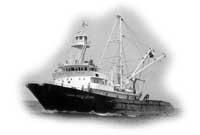Research project 95/13IP of the Basque Government
1998/10/01 Gallastegui Zulaica, Mari Karmen Iturria: Elhuyar aldizkaria
As in other areas of economic science, the literature on renewable resources is developing complex dynamic models. Considering the case of fishing as a paradigmatic case of research, the objective of these models is to clarify why fishing resources are abused and why insufficient yield is not obtained. The starting point is mastering the causes of resource mismanagement as the first necessary condition for experts to design actions to eliminate abuses.
There are two main difficulties for proper fishing management. On the one hand, since fishing resources have their own conditions of reproduction and growth, it is necessary to know the biological laws of their evolution and it is not always easy to get their empirical knowledge. On the other hand, there is great uncertainty in the exploitation of these resources, since in addition to knowing the level and status of stocks, it is very difficult to know the impact that fishing activity can have on biomass in case of change of situation. Time, difficulty in finding resources, the tendency of many species to move, etc. make it impossible to know the concrete consequences of the stocks that have the implemented measures. Therefore, we have begun to think that, as is done in environmental issues, it is advisable to apply the precautionary principle and ensure a series of resources.

The way to use the precautionary principle in fisheries management is to analyze what can be learned by applying financial management to fisheries management and what strategies can be known. In situations of uncertainty, and in the context of risk that arises, would it be convenient for the investor to diversify the assets and not concentrate the risk, if it suits him, not to diversify it also in matters of fishing, establishing, among other things, prohibitions of specific state of exploitation for resources with risk of exhaustion by overexploitation?
Unpredictable events make it very difficult to implement control measures in the world of fishing. In fact, when it comes to changes in fish catches and it is not possible to determine their amount in advance, the aforementioned measures generate important management expenses, which in many cases are not successful. Therefore, they begin to investigate alternatives such as C.W. Clark, T. Lauck and G.R. More protected reservation proposed by Munro in 1995.
The opposite argument would be that instead of keeping the stock protected, a more conservative management strategy would be opted for, for example, to stop capturing a fish population much higher than the average in the medium term. This proposal would change the management's goal of trying to achieve greater biomass instead of a biomass holding operation by performing as many catches as possible. However, if there is great uncertainty and tolerance, at least in some species, is high, the aforementioned strategy is too dangerous to calculate the amount of fish that could be caught and it is necessary to make a greater effort in protecting resources.
Therefore, the application of the precautionary principle to the management of renewable resources is an option to take into account, although, being realistic, we must recognize that both the dynamics of fish stocks and the initial number can present great variations. In addition, even if appropriate capture targets have been set and are to be met, these factors cannot be ensured to conform to the preset level.
As in other areas of economic policy (remember that because of the difficulties of monetary and exchange policy, activity bands have been proposed rather than specific objectives), it is sometimes necessary to recognize that the fulfilment of the targets also marked on fisheries is impossible.
- Project title: Uncertainty Economy, Attention Principle and Risk Coverage Techniques in Environmental and Natural Resource
Management. - Project objective: Clarify why
overuse of fishery resources and why insufficient benefits are obtained. - Director: Mª Carmen Gallastegui Zulaica.
- Working team: Alberto Ansoategui Cobo, Jose Manuel Chamorro and Raúl Prellezo (scholar).
- Department: Economy of Uncertainty.
- Faculty: Faculty of Economics and Business Sciences.

Gai honi buruzko eduki gehiago
Elhuyarrek garatutako teknologia






